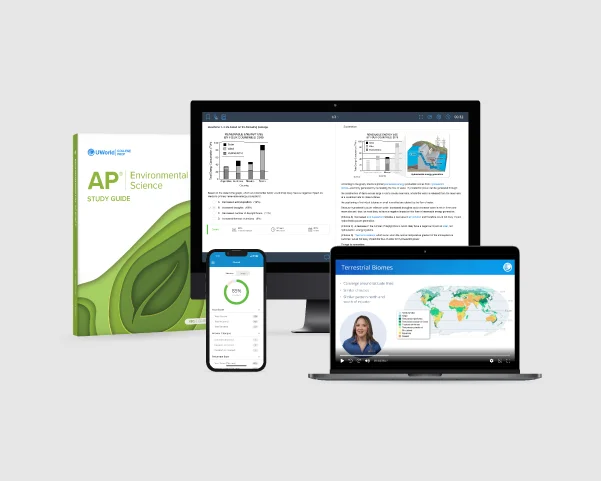Ready to tackle AP Environmental Science? While self-studying might seem daunting, UWorld's comprehensive resources can make your journey smooth and effective. This guide will walk you through a step-by-step approach, helping you build a solid foundation, master complex concepts, and ace the AP exam.
Step 1: Lay the Groundwork with UWorld’s AP Environmental Science Study Guide
The first step in self-studying for AP Environmental Science is to build a solid foundation of the basic principles and key concepts. UWorld’s study guide is designed with a focus on accessibility, making it an ideal starting point for independent learners.
-
Clear Visuals and Up-to-Date Information:
AP Environmental Science covers diverse topics, from ecosystems to human impact on the environment. UWorld’s guide includes visuals, graphs, and diagrams that make these abstract topics easier to understand, helping you see complex concepts in a structured way. Additionally, the content aligns with the current AP curriculum, ensuring you’re studying relevant material.
-
Logical Structure for Step-by-Step Learning:
The study guide is organized to guide you through foundational topics before advancing to more complex environmental issues. This structured progression makes self-study more manageable, helping you grasp each concept thoroughly before moving to the next.
-
Accessible in Both Digital and Physical Formats:
UWorld’s study guide is available in both digital and physical versions, giving you flexibility in how and where you study. The seamless integration between formats makes it easy to transition from reading on your device to studying from a physical book, keeping your learning consistent.
-
Comprehensive Without Overwhelm:
The study guide provides a well-rounded overview without excessive detail, allowing you to master the fundamentals without getting bogged down. Use this phase to build a solid understanding of core topics, noting any areas where you need additional practice or clarification.
Step 2: Deepen Understanding with UWorld’s Video Explanations for Complex Topics
Once you’re comfortable with the basics, you’ll likely encounter topics in AP Environmental Science that require a deeper understanding—such as biogeochemical cycles or population dynamics. UWorld’s video explanations are invaluable for these more challenging areas, offering concise lessons that are easy to digest.
-
Focused, Bite-Sized Lessons:
Each video covers a specific topic, keeping information segmented and focused. You can watch, pause, and rewatch these videos at your own pace, making it easy to understand even the most complex subjects.
-
Visually Rich and Engaging Content:
UWorld’s videos use animations, graphics, and real-world examples to clarify difficult topics. Visual aids are particularly effective in environmental science, where seeing concepts like food webs, pollution impacts, or energy flows can enhance understanding.
-
Experienced Instructors for Clear Explanations:
The videos are led by knowledgeable instructors who break down challenging topics in a relatable, conversational style. Their approach feels supportive, helping you grasp difficult concepts as though you were learning one-on-one with a tutor.
Step 3: Practice with UWorld’s Exam-Level Questions
After establishing a foundational understanding and working through complex topics with video support, it’s time to test your knowledge. UWorld’s AP Environmental Science practice questions mirror the difficulty and style of the AP exam, allowing you to practice in a way that builds confidence and exam readiness.
-
Authentic, Exam-Style Questions:
UWorld’s questions are designed to replicate the AP Environmental Science exam, including multiple-choice questions and data analysis problems. This familiarity with question types and complexity helps you feel comfortable with the format, reducing anxiety and improving your test-taking skills.
-
Detailed Explanations to Reinforce Learning:
Each question includes a comprehensive answer explanation, detailing why the correct answer is right and why the other options are incorrect. This insight helps you learn from mistakes, clarify misunderstandings, and strengthen your reasoning abilities.
-
Track Progress and Target Weak Areas:
As you complete practice questions, review your performance to identify areas where you may need additional review. Adjust your study plan to revisit those topics in the study guide or videos, ensuring that you’re continually improving and refining your knowledge.
Step 4: Retain Key Information with Custom Notes and Flashcards
In self-study, consistent review is essential for retaining information and ensuring long-term recall. Creating your own notes and flashcards allows you to revisit key concepts regularly, reinforcing what you’ve learned.
-
Make Digital Flashcards for Key Terms and Concepts:
Use tools like Anki, Quizlet, or UWorld’s own flashcard feature to create cards for essential vocabulary, scientific processes, and environmental laws. Reviewing these flashcards frequently helps you retain important information and makes it easier to recall terms quickly during the exam.
-
Summarize Each Topic in Your Own Words:
After studying each topic, take a few moments to summarize it in your own words. This process not only reinforces understanding but also creates a valuable set of personalized notes for quick review later on.
-
Set Up a Regular Review Schedule:
Spend a few minutes each day or week reviewing your notes and flashcards. Consistent review is a powerful tool for building memory and making sure you retain critical information, preventing last-minute cramming.
Staying Accountable and Motivated During Independent Study
Self-studying AP Environmental Science requires motivation and structure, especially without the accountability of a teacher or classroom. Here are some strategies to keep yourself on track throughout your study journey:
-
Set Clear, Achievable Goals:
Break down your study plan into small goals, like completing a specific topic each week or answering a set number of practice questions. Achieving these milestones provides a sense of progress and motivates you to keep going.
-
Organize Your Study Sessions in a Planner:
Use a digital or physical planner to record what topics you’ve covered, track your practice question scores, and highlight areas for review. This organization provides a visual representation of your progress and keeps you focused on your goals.
-
Reward Yourself for Completing Milestones:
Self-study can be intensive, so celebrate your achievements along the way. Whether it’s finishing a difficult section or scoring well on practice questions, take time to reward yourself to keep your motivation high.
-
Join an Online Community for AP Environmental Science:
While self-studying can feel isolating, joining online communities and forums for AP Environmental Science allows you to connect with others preparing for the exam. These spaces offer support, answer questions, and provide a sense of camaraderie as you work toward your goals.
Conclusion
Preparing for AP Environmental Science independently may seem challenging, but with the right resources and a structured approach, it’s entirely achievable. Begin by laying a foundation with UWorld’s study guide, dive into complex topics with video explanations, and test your knowledge with exam-like practice questions. Reinforce your learning through customized notes and flashcards, ensuring you retain critical information for exam day.
Independent study requires discipline, but UWorld’s resources make it possible to approach AP Environmental Science with confidence and clarity. By setting goals, staying organized, and reviewing regularly, you’ll gain the skills and knowledge necessary to excel on the AP exam. Embrace the process of self-study, and remember that with consistency and the right tools, success is well within reach. Good luck!




